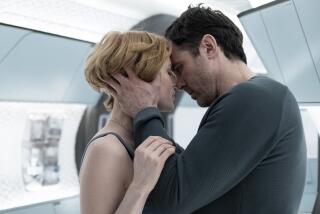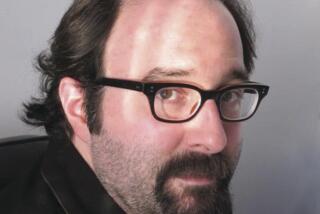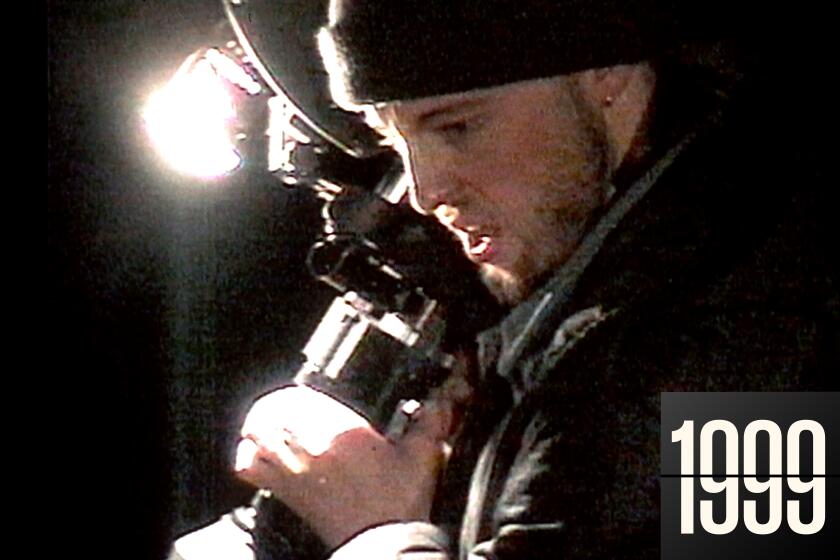Tom Hanks: Six singular sensations in ‘Cloud Atlas’
“Cloud Atlas,” the film adaptation of David Mitchell’s bestselling, puzzle-like, 2004 adventure novel, asks a lot of its audience — and its stars.
The nearly three-hour movie from directors Tom Tykwer and Andy and Lana Wachowski tells six interconnected tales spanning hundreds of years and a multitude of genres, from a 19th century sea story to a Hawaii-set dystopia.
Tom Hanks appears in all six of them in various bewigged and prosthetically enhanced states. But the actor at first had trouble diving into Mitchell’s deliberately dizzying novel. “I had read 80 pages of it and said, ‘I can’t take this,’” Hanks said. “I couldn’t penetrate it.”
PHOTOS: 2012 Fall movies sneaks
Then after reading the screenplay that Tykwer and the Wachowskis wrote, which breaks up Mitchell’s six consecutive narratives into concurrently unfolding stories, Hanks gave it another chance.
“The story just hangs with you,” he said. “It just lingers and lingers and lingers. When you read something like this and it hangs with you, it’s, ‘Wait, that meant something. Let me figure out what that meant.’”
In the Warner Bros. film, opening Oct. 26, Hanks portrays a corrupt doctor on a sailing vessel in the South Pacific, a nosy clerk at a shabby European hotel in the 1930s, a conflicted nuclear scientist in 1970s Northern California, a thuggish gangster-slash-author in contemporary London, a minor character in a TV movie being watched in a totalitarian future society in Korea and a tormented post-apocalyptic tribesman on the Big Island.
Hanks’ deep roster of costars, including Halle Berry, Hugh Grant, Jim Sturgess, Hugo Weaving and Jim Broadbent, also appear in a multitude of roles, a casting trick that helps drive home the movie’s theme of interconnectedness. Berry’s and Hanks’ characters meet in the 1970s — he as a scientist, she a journalist, and reconnect in the far future, he as a primitive survivor and she as a representative of a more technologically advanced society.
“An awful lot of movies are really only about one thing — one man’s struggle, blah, blah, blah,” Hanks said. “David Mitchell in the book and our filmmakers, they’re talking about love, passion and evil and how your acts now will have ramifications thousands of years in the future. It’s cool to ponder.”
Apart from the narrative ones, there were logistical reasons to cast actors such as Hanks in multiple roles. With one sprawling movie made up of six 20- to 30-minute episodes, any individual part is essentially a cameo — to attract the stars who could help sell such a complex film to investors and audiences, the directors would need to have meaty work for their actors to do. For Hanks, the chance to play six wildly varying characters added up to one big enticement.
After a strenuous, three-year effort to secure financing from multiple international sources, the directors divided the labor on their sets in Germany, the Spanish island of Majorca and Scotland, with the Wachowskis (“The Matrix” trilogy, “Speed Racer”) taking the 19th century sea and two futuristic stories and Tykwer (“Run Lola Run”) the others.
To inhabit the wildly different parts, Hanks wore adornments like a bulbous nose, ‘70s-style helmet hair and a burlap hoodie that looks as if it survived the end of the world.
“Every one of [the roles] was this tactile experience that could not be denied, the layers of stuff they put on you in order to get there in the first place,” Hanks said. “You go in the makeup trailer knowing what you’re gonna be shooting that day, and an awful lot of the character work is done for you because they keep applying things on top of you.”
For one character — the goateed, gold chain-wearing “Knuckle Sandwich” author Dermot Hoggins — Hanks’ physical transformation was so complete that the dozens of extras on set didn’t recognize him.
For another — primitive, Big Island dweller Zachry — the metamorphosis came largely in the character’s means of expressing himself, either nonverbally or in a kind of pidgin English.
“The real bona-fide challenge was playing Zachry, ‘cause he’s tortured and haunted,” Hanks said. “In order to communicate that without any of the prose, it was all body language and eyes and moments.”
Though both the novel and the film link the stories, Hanks said he saw his roles as singular men.
“I understand some people are saying, ‘Oh, it’s a movie about reincarnation,’” Hanks said. “I wouldn’t be surprised if that is something Andy and Lana and Tom had in their pocket. But I thought of them as wholly different people. My thing was to be in the moment 100% and possess the present of what I was doing, whatever character I was in.”
More to Read
Only good movies
Get the Indie Focus newsletter, Mark Olsen's weekly guide to the world of cinema.
You may occasionally receive promotional content from the Los Angeles Times.









